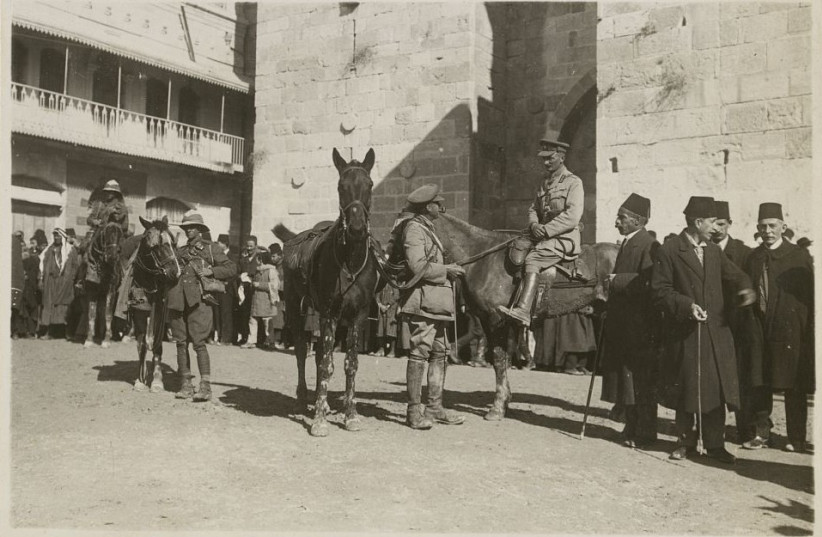World War I was a dress rehearsal. It permitted the antisemites in Eastern Europe to practice murder, rape and expulsion of their Jewish neighbors along with stealing their property, according to author Larry Domnitch.
Twenty-five years later, they would perfect their antisemitic thefts and assaults under the guidance of the Nazis.
What the Poles, Hungarians, Lithuanians, Russians and others lacked in German efficiency and organization, they made up for in their hatred for Jews and in their cruelty.
It’s no wonder that so many people in that region not only enthusiastically supported the Nazis in their “Final Solution of the Jewish Question” but also zealously lent a hand in its execution.
It began with that old, reliable, often-used tool of the antisemite: scapegoating of Jews. When the Russian army suffered setbacks, Jews were falsely blamed for supplying the Germans with money, food and intelligence. Defeats of the German army were caused – in the words of many Germans – by Jewish perfidy and draft evasion.

How many Jews fought in World War I?
Actually, writes Domnitch, German Jews rushed to the colors, hoping to end antisemitism by showing their loyalty to the German state. But the Germans often linked their defeats to Jews avoiding service on the battlefield. The German War Ministry did a survey to see how many Jews took part in combat. The study found that 80% had served on the front lines, but those figures were not released.
Jews comprised 2% of Central Powers’ soldiers and 2.5% for the Allies, the author notes. More than 170,000 Jews from both sides were killed in battle, about the same percentage as found in the armies – more evidence that contradicted the calumny that Jewish soldiers got cushy, non-combat jobs.
In August 1914, after the Germans stemmed the initial Russian advance and began the invasion of Russian Poland, Jewish communities along the line of German advance suffered.
Atrocities were committed against Polish Jews, but the perpetrators were freelancing, not acting according to German policy, the author states.
Frightened Jews began to flee, “marking the beginnings of the massive flight of Jewish refugees during the war.”
The retreating Russians expelled some Jews from their homes and carried out “devastating attacks” on others, resulting in mass flight.
“Violence was perpetrated against them and against their honor, having turned in part from self-sufficient people into beggars.” Many, especially children, died of starvation, writes Domnitch.
“The Jews were murdered, women violated in the streets. The hands of the elderly and of the women were cut off and they were left to die in agony.”
Larry Domnitch
One Jewish soldier recounted the suffering he had witnessed. “The Jews were murdered, women violated in the streets. The hands of the elderly and of the women were cut off and they were left to die in agony.”
The worst crimes against Jews were committed by Cossacks in Ukraine
Sometimes, the Jews were assaulted without the knowledge or consent of military officers. Other times when authorities were near, skulduggery was called for. In one such incident, the Cossacks spoke to Polish Jews in Russian. When the Cossacks were sure that the Jews didn’t understand what was said, they dragged the people to their commander, telling him, in Russian, that the Jews were spies. Without even asking for evidence, the commander ordered the Cossacks to execute the “spies.”
Some of the worst crimes were committed by Cossacks in Ukraine during the post-World War I civil war. According to a report, the Cossacks murdered “all the Jews in the houses [in the town of Proskurov] without distinction of age or sex. They killed old men, women and even nursing babies. They not only cut them down with the sword, but also thrust them through with bayonets.”
The good things that happened to the Jews in World War I
Not everything that happened from 1914 to 1918 was negative for the Jewish people. There were fundraising drives in the US and elsewhere to help European Jewry.
The Zion Mule Corps was formed as a Jewish unit to transport supplies to frontline troops in the ill-fated British Gallipoli campaign against the Turks. The unit was dismantled in May 1916.
Later, the Jewish Legion, composed of Jewish volunteers who fought in the battles of Jerusalem and Megiddo, was formed as part of the British army.
And, of course, the Balfour Declaration – international recognition of the Jewish people’s right to its historic homeland – was issued in 1917, declaring that the British government views “with favor the establishment in Palestine of a national home for the Jewish people.”
The Impact of World War One on the Jewish People shines a spotlight on the rampant antisemitism in Eastern Europe, which, some 25 years later, helped the Nazis carry out their mass murder of millions of Jews in such a timely manner.
The writer’s memoir, Figs and Alligators: An American Immigrant’s Life in Israel in the 1970s and 1980s (Chickadee Prince Books), is available online and at bookstores.
The Impact of World War One on the Jewish People
By Larry Domnitch
Urim Publishers
222 pages; $26.95
